|
|
|
Sort Order |
|
|
|
Items / Page
|
|
|
|
|
|
|
| Srl | Item |
| 1 |
ID:
130422
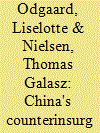

|
|
|
|
|
| Publication |
2014.
|
| Summary/Abstract |
China's counterinsurgency strategy in Tibet and Xinjiang relies heavily on hard power and imposition. Well-functioning vertical coordination in the security sector of China's political system and assimilationist nationality dynamics combine to favour the use of force against ethnic groups that do not accept the political legitimacy of China's Communist Party. Transnational links contribute to China's difficulties with implementing counterinsurgency in Tibet and help China implement its strategy in Xinjiang. Development strategies aimed at improving living standards are crowded out due to a lack of horizontal coordination between civilian and security agencies and a bias towards unitary nation-building in Chinese nationalism.
|
|
|
|
|
|
|
|
|
|
|
|
|
|
|
|
| 2 |
ID:
130415
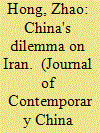

|
|
|
|
|
| Publication |
2014.
|
| Summary/Abstract |
As international pressure on China's policy concerning its increasing investments in Iran grows, the Chinese leadership has to painfully balance its impulse toward energy and economic cooperation with Iran against other important interests, including enhancing its image as a responsible big country. After analyzing the evolution of China-Iran energy relations, this paper tries to answer the question of how China has responded to the intensification of US-led sanctions against Iran, what merits and shortcomings China's attempts to balance or reconcile its interests in Iran might create, and what options China can take to deal with a possible oil crisis.
|
|
|
|
|
|
|
|
|
|
|
|
|
|
|
|
| 3 |
ID:
130416
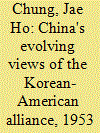

|
|
|
|
|
| Publication |
2014.
|
| Summary/Abstract |
This article reconstructs an ideational trajectory in which China's views of the Korean-American alliance evolved during the last 60 years. The article first surveys China's general policy toward alliance and alliance-making. The article then traces the evolutionary path of Chinese views in the following four periods: (1) the Cold War era (1950s-1960s); (2) transformative years (early 1970s-mid-1990s); (3) the period of a strained alliance (late 1990s-late 2000s); and (4) an era of great reversal (late 2000s-present). Principally, the article suggests that China's view of the Korean-American alliance was intense antagonism during the Cold War era, although it was significantly watered down during the transformative years of Sino-South Korean rapprochement. With the normalization of relations between Beijing and Seoul in 1992 and a decade of progressive rule (1998-2007) in South Korea, China's view encompassed some wishful thinking about a gradually diluted alliance. The strong comeback of the conservatives in South Korean politics since 2008, however, shattered such optimism and re-awoke Beijing to some cold realities. China's view of the Korea-American alliance may grow more negative in tandem with US-China relations, irrespective of the official rhetoric of sovereignty regarding alliance and alliance-making.
|
|
|
|
|
|
|
|
|
|
|
|
|
|
|
|
| 4 |
ID:
130426
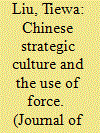

|
|
|
|
|
| Publication |
2014.
|
| Summary/Abstract |
This article reviews and explains Chinese attitudes towards the use of force in international affairs, especially from the perspective of strategic culture. The author traces back the traditional values which originated from ancient Chinese thoughts and also researches Mao Zedong's perception of war, which symbolizes the contemporary Chinese military strategic theory, and Deng Xiaoping and Hu Jintao's discourse on war thereafter, which represents the beliefs of the Chinese government after adopting the opening-up and reform policy. The case studies of the Korean War, the Vietnam War and the two Iraq Wars further explore the principles which dominate the diplomatic decision-making processes. The article concludes that China, in the predictable future, will still firmly adhere to the principles of state sovereignty, non-interference and non-use of force principles, while at the same time China will not hesitate to participate in the multilateral operations which are ratified with UN Security Council authorization and contribute increasingly to improving humanitarian situations due to its moral and political understanding of the use of force in international relations
|
|
|
|
|
|
|
|
|
|
|
|
|
|
|
|
| 5 |
ID:
130421
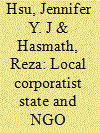

|
|
|
|
|
| Publication |
2014.
|
| Summary/Abstract |
This article examines the Chinese state's interactions and influences on the development of non-governmental organizations (NGOs) through a corporatist framework. It suggests that not only is the central state actively involved in the development of NGOs, but increasingly the successes of NGOs are determined by their interactions with the local state. We profile NGOs in Shanghai, of varying sizes, budgets and issue-areas, as a case study to understand the interplay between NGOs and the local state. The article further discusses reasons behind the growing shift from central to local state influences, and the potential future implications for state-NGO relations in China
|
|
|
|
|
|
|
|
|
|
|
|
|
|
|
|
| 6 |
ID:
130420


|
|
|
|
|
| Publication |
2014.
|
| Summary/Abstract |
Chinese economic and social development in the past three decades has been typically state-led, in which capital and government officials are gradually allied through guanxi-a social psychological network that connects individuals with continued exchanges of favours, emotions and resources. This transforms many traditional characteristics of guanxi and encodes it with new features deeply rooted in institutional settings in contemporary China, which we term as neo-guanxilism. Although 'local state corporatism' has strong explanatory power in analysing the alliance of enterprises and local government, we argue that this type of neo-guanxilism could fill the gap uncovered by local state corporatism, mainly through emphasizing government officials as interdependent actors instead of viewing the local state as a collective, capturing not only the developmental but also the predatory aspects of local governments.
|
|
|
|
|
|
|
|
|
|
|
|
|
|
|
|
| 7 |
ID:
130414


|
|
|
|
|
| Publication |
2014.
|
| Summary/Abstract |
Is there mutual benefit in a relationship between the People's Republic of China and the North Atlantic Treaty Alliance (NATO)? At first glance, China and NATO appear to have little to offer one another, and many obstacles to cooperation exist. But distinct (and different) benefits exist for both parties should they elect to pursue a relationship based on interests. NATO and China share a common interest in maintaining international security, and increased interaction can thus appeal to NATO's desire to extend cooperative security beyond the Euro-Atlantic area while offering the Chinese a means for protecting their interests on the global stage in a constructive, non-threatening manner. While both NATO and China have interests in Afghanistan, the most fertile ground for a future relationship lies in mutual interests in four 'politically acceptable' domains: crisis management, humanitarian assistance/disaster relief, counter-proliferation and counter-piracy. Increased interaction will present both NATO and China with risks, but these are ultimately outweighed by the potential benefits.
|
|
|
|
|
|
|
|
|
|
|
|
|
|
|
|
| 8 |
ID:
130419
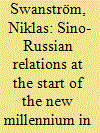

|
|
|
|
|
| Publication |
2014.
|
| Summary/Abstract |
Sino-Russian relations have swayed considerably in the second millennium. During the Yeltsin era, China-Russia relations were still strong, but this changed abruptly after Putin's accession to the presidency in 2000 and his initial pro-Western adventures. This was, in no small part, due to Russia's involvement in the war on terror, together with Russia's complicity in a US military presence in Central Asia which did not go down well in Beijing. Putin's domestic constituency found his swing into Washington's fold equally awkward, which created no small amount of criticism in Russia. Convinced that things could not get much worse, Putin's acceptance of NATO's expansion into the Baltics, his approval of US withdrawal from the ABM-treaty, and his quiet consent for an American military presence in Georgia raised additional fears in the Duma, within Russian public opinion, and to some extent among the Chinese. This was perceived as a direct surrender to American superiority and aggression, and it would not last for long.
|
|
|
|
|
|
|
|
|
|
|
|
|
|
|
|
| 9 |
ID:
130418


|
|
|
|
|
| Publication |
2014.
|
| Summary/Abstract |
The Trans-Pacific Partnership (TPP) was accepted by the Asia Pacific Economic Cooperation (APEC) as one among other pathfinders, for a comprehensive Free Trade Area of the Asia Pacific (FTAAP). Though the TPP negotiations do not include China at the moment, she has declared her interest in the TPP and is paying close attention to it. In fact, many question the likely success of the TPP with China's exclusion from it, given her prominence in the region. To provide insights for leveraging trade opportunities with the TPP economies, China's export potentials with the TPP are empirically tested and compared with those of alternative economic configurations in East Asia which China is a party to, namely the ASEAN+1, ASEAN+3 and ASEAN+6. The empirical findings suggest that China's participation in the TPP will offer better market access for final goods, an important trade opportunity that is somewhat limited in partnerships through regional initiatives. Even then, the paper contends that the payoffs to China following the TPP deal remain intangible and at best speculative given the coverage (or substance) and depth of the agreement.
|
|
|
|
|
|
|
|
|
|
|
|
|
|
|
|
| 10 |
ID:
130417
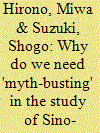

|
|
|
|
|
| Publication |
2014.
|
| Summary/Abstract |
The literature on Sino-African relations has debated whether or not China's growing presence is a threat to Western or African interests, and has come to the conclusion that China's behavior is not uniquely immoral. Many countries, including Western liberal democracies, similarly give aid to local autocrats to secure natural resources. Why, then, has so much effort been made to come to this perhaps unsurprising conclusion? We argue that the literature on Chinese foreign policy remains heavily influenced by Western states' policy interests, resulting in an impoverished debate that is primarily concerned with the idea of a China threat. In order to recover the diversity in our research on Chinese foreign policy, we argue for the need to go beyond the confines of Western strategic interests.
|
|
|
|
|
|
|
|
|
|
|
|
|
|
|
|
|
|
|
|
|